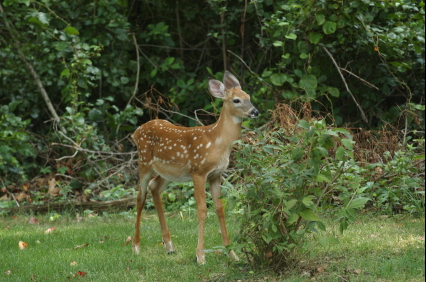
To the casual observer, deer can be cute and endearing parts of the natural world. To hunters they can be a source of both food and prestige. But for those of us who enjoy cultivating plants in our backyards, and who live near deer habitats, these animals can be outright pests. When a deer is hungry it will become audacious in the pursuit of food – and its appetites may draw it to any number of things that we may be growing in our gardens. After losing crops and flowers to these marauders – and seeing the surrounding grounds repeatedly trampled – we’re far less likely to feel endeared to them. If we want to preserve our gardens, we’ll have to devise ways to let them know that they aren’t welcome.
Deer populations have grown dramatically in the last few decades, and more people than ever before have experienced unfortunate encounters with them. They’ve even become a significant threat to motorists in many areas. Those of us who discover them frequenting our gardens won’t typically have to worry about physical harm, but the toll that these animals take on the gardens that we so painstakingly care for can be a source of real frustration. The most sure-fire way to forbid deer from coming in and snacking on our vegetables, flowers and herbs is to enclose our gardens with high walls or fences. Many of us don’t have the means to do this, however, so we have to find ways to keep deer out of the garden without making extreme renovations.
We can avoid plants that deer are drawn to and cultivate only those varieties that they have an aversion to. But then we’re essentially letting the deer run our lives in the yard and not using our gardens for our own self-expression and enjoyment. It is possible to grow what we like, however, and then implement a few other plantings to make the whole area less deer friendly. Certain plants have a strong aroma that deer dislike. These include yarrow, Black-eyed Susan, oregano, several varieties of sage, and lemon balm. Consider planting some of these varieties around the perimeter of your garden so that foraging deer won’t want to go any farther. The strong scents produced by these plants will also mask the scents of plants that deer like. Since these animals are reliant upon their sense of smell, this tactic effectively makes other crops invisible to them.
You can also create barriers – with hedges or bushes, for example – so that these animals can’t see your garden and therefore won’t be tempted to venture into it. Or you might opt to take the reverse tact, and offer something that deer would want to eat (out on the edges of your property, for example) in order to divert them away from the garden plants that you want to protect. Apples, corn, brambles, strawberries, and string beans all work well for this purpose.
It is possible to create “scent barriers” without altering the makeup of your garden at all. This is achieved by either spraying certain food products directly onto your plants or else hanging them from tree branches or fence posts. Various household products that gardeners have used to ward off deer include cayenne pepper, garlic, mothballs, rotten eggs, onions, Tobasco sauce, shampoo, tobacco, cumin, and dry mustard.
Resources:
